Where's the Line?
Freedom of Speech
UF's campus allows free speech in all outdoor areas
Anyone can draw a crowd on campus, as long as it's outside
By: Ashleigh Lucas
Plaza of the Americas has always been a quieter part of UF’s campus. Students come in waves every weekday afternoon to buy vegetarian and vegan lunch sold by the Hare Krishnas, read a book or leisurely relax on a hammock.
Thanks to legislation passed in 2018, however, Plaza was everything but tranquil on Monday, Feb. 7, 2022.
Waving a bright red communist flag, vigorously shaking a sign that reads “Welcome to the Whoring Grounds,” and screaming chants like “Ho No Mo” at the top of their lungs, more than 500 UF students egged on a controversial TikTok internet sensation, Sister Cindy, 63. Cindy Smock, better known as Sister Cindy, is an evangelist with over 360,000 TikTok followers and draws crowds at universities across the country.
“Welcome to the Ho No Mo’ revolution,” she shouts, as students holler in unison.
Despite the rowdy crowd that dwindled throughout the day, campus police were nowhere to be found.
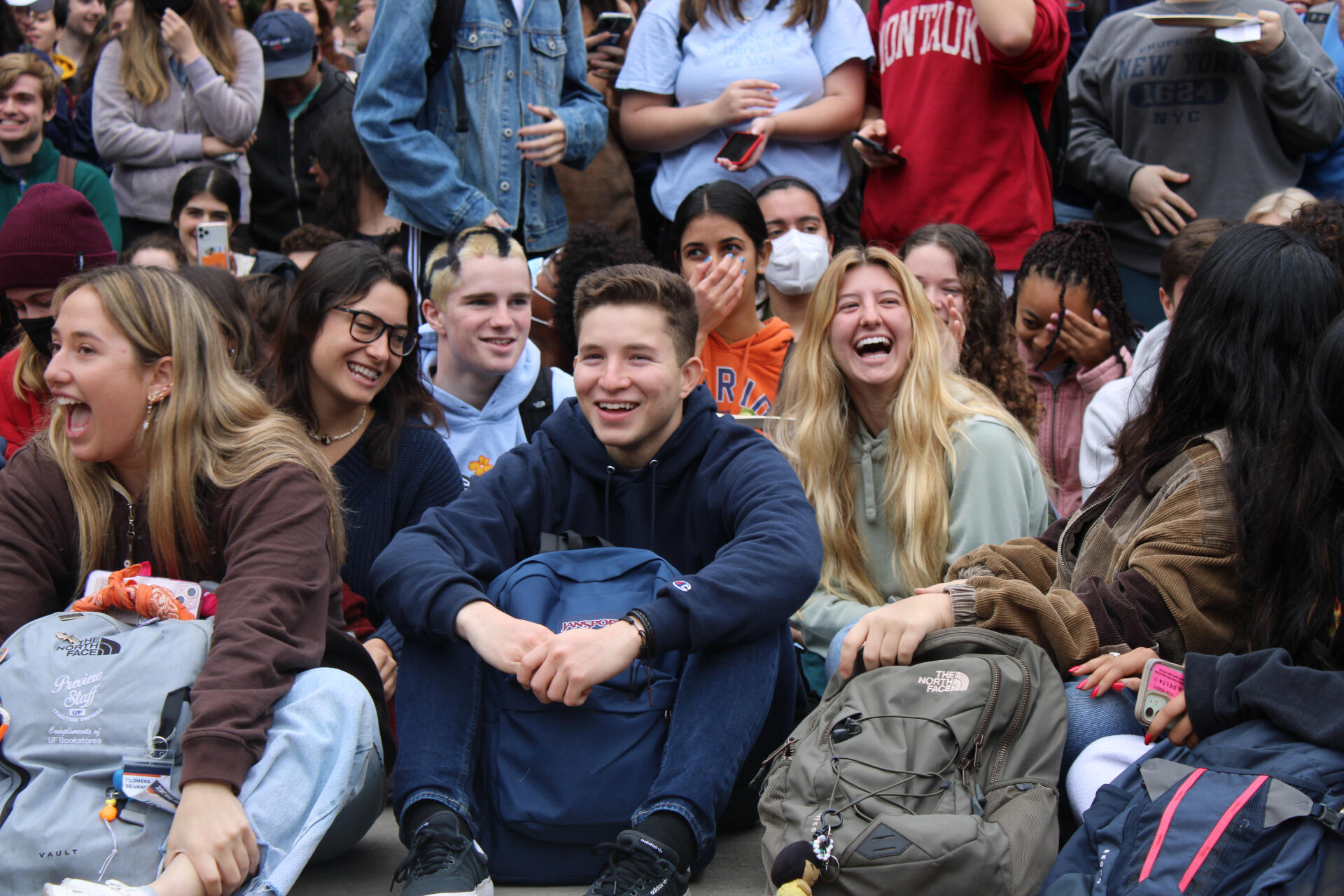
Photo by: Ashleigh Lucas
Students gathered around Sister Cindy in Plaza of the Americas on Monday, Feb. 7.
Freedom of speech is one of the fundamental rights protected by the First Amendment, along with freedom of the press, assembly, religion, petition and expression. Florida public universities are obligated by law to protect First Amendment rights and cannot deny people anyone’s right to vocally—and visually—express their opinions on campus.
Specific areas known as “free speech zones,” used to be designated to those like Sister Cindy who wanted to come to campus and express their views.
As of 2018, though, choosing just one space on campus to be a free speech zone would be outlawed.
Florida Gov. Ron DeSantis signed the Campus Free Expression Act in March of 2018, forbidding the establishment of designated free speech zones and instead made all spaces accessible for free speech demonstrations.
Clay Calvert, a UF law professor and director of UF’s First Amendment Project, said the law transformed the scope of where outsiders could come onto UF campus to draw crowds. Before 2018, a select few locations like Turlington Plaza and Plaza of the Americas were the designated free speech zones at UF.
“The notion that free speech is confined to a particular area on campus by state law — that's invalid,” Calvert said.
“Public spaces outside grassy areas, sidewalks, public areas like that. All of those are really considered areas where students can engage in free speech.”
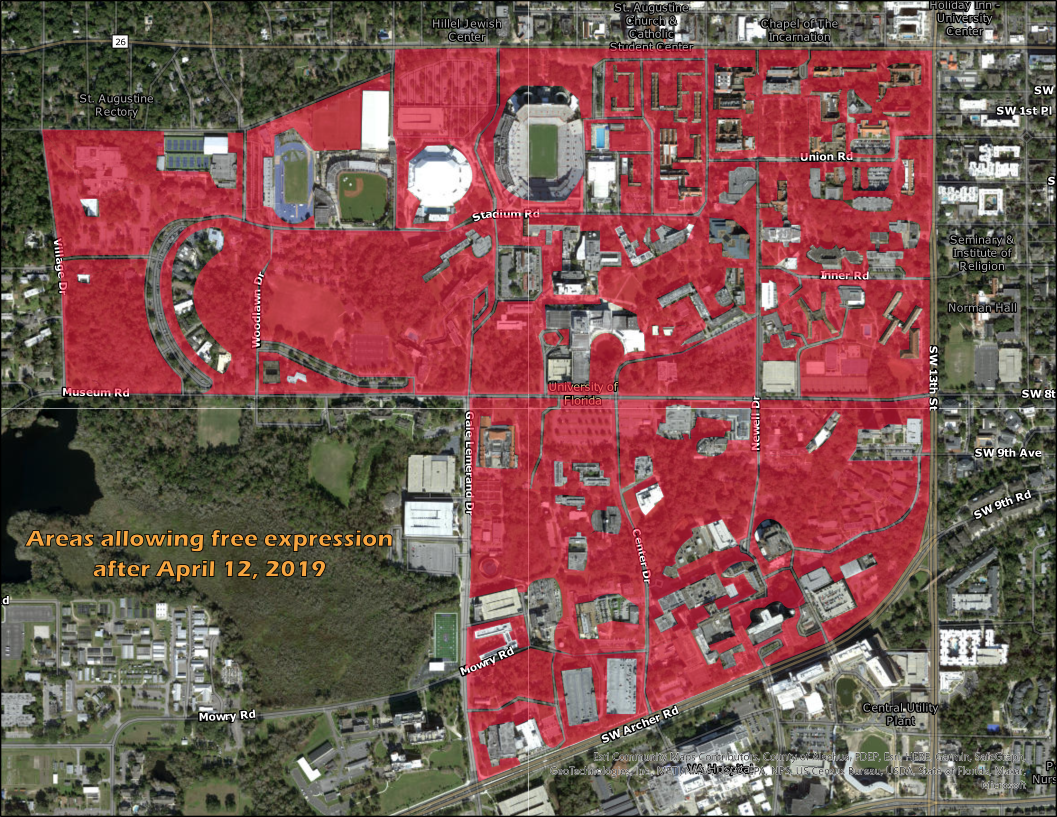
Map by: Leo Ramsey-Watson
The University Police Department did not respond to requests for comment via phone and email.
UF spokesperson Cynthia Roldan affirmed the university’s commitment to protecting free speech on campus.
“UF does not restrict free expression rights to specific areas of campus,” Roldan wrote in an email. “Rather, UF considers outdoor areas of campus as traditional public forums. In those areas, any person can engage in spontaneous or contemporaneous expressive activity so long as the person’s conduct remains lawful.”
Calvert said the First Amendment is widely misunderstood among the public. The right to free speech would only be forfeited if it doesn’t cross into the category of “fighting words,” which are those targeted to initiate or encourage violence.
So, Sister Cindy was well within her rights to attract such an immense crowd.
“The First Amendment gives people a lot of breathing room to say offensive and disagreeable thoughts and ideas,” Calvert said.
“That's why we have the First Amendment to protect dissenting viewpoints — to allow people to express views that may not be popular.”
However, above all, passersby have the freedom to leave the crowd and avert their ears, he said. That’s why Sister Cindy wasn’t ushered away by police.
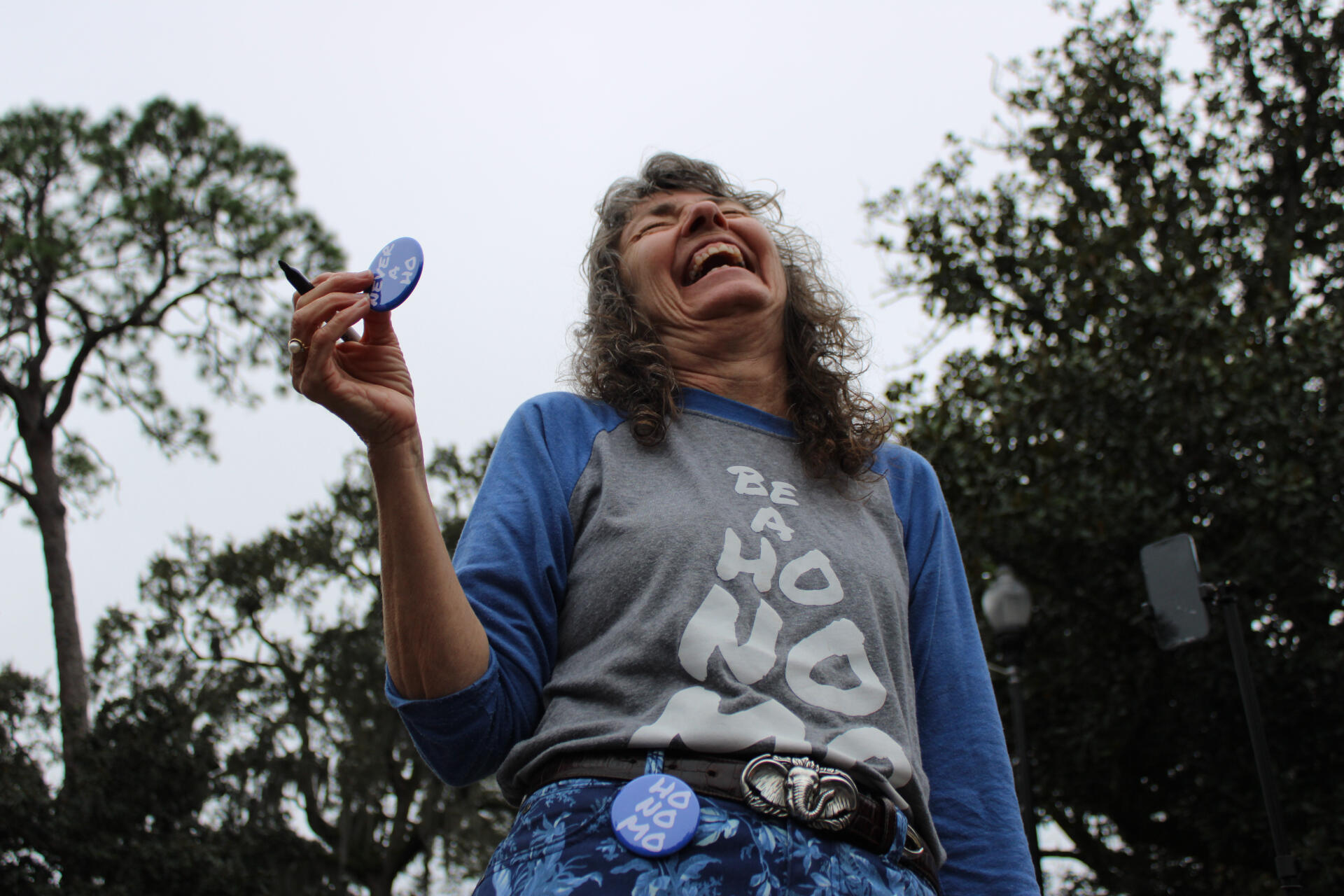
Photo by: Ashleigh Lucas
Sister Cindy handing out a "Ho No Mo" pin in Plaza of the Americas on Monday, Feb. 7.
Smock was a UF journalism student in the ‘70s, so Sister Cindy’s familiarity with this campus brought her back to reminisce on her promiscuous days as a student. She even was a staffer at The Independent Florida Alligator. After meeting Brother Jeb, her now 79-year-old husband, she converted to a devout lifestyle following Christianity—and embarked on a quest throughout the U.S. to save ‘hos.’
Sister Cindy was not deemed a “direct threat.” However, students, faculty and community members are left with the question: Why did so many students gather around her in the first place?
Sister Cindy’s “Ho No Mo'' platform openly demeans women and the LGBTQ+ community. However, at universities across the country, minority groups show up in full force.
Draped in a orange and pink lesbian flag, Harmony Gibaldi, a 20-year-old UF psychology and women’s studies sophomore, attended Sister Cindy’s rally waving a sign that read “Let’s Go Lesbians!” She said she used the rally as a way to show up for the LGBTQ+ community.
"Why not make it heard that I'm here and I'm proud to be who I am?” she said. “I might as well make it seen that I am proud of my sexuality and I am fully comfortable in it.”
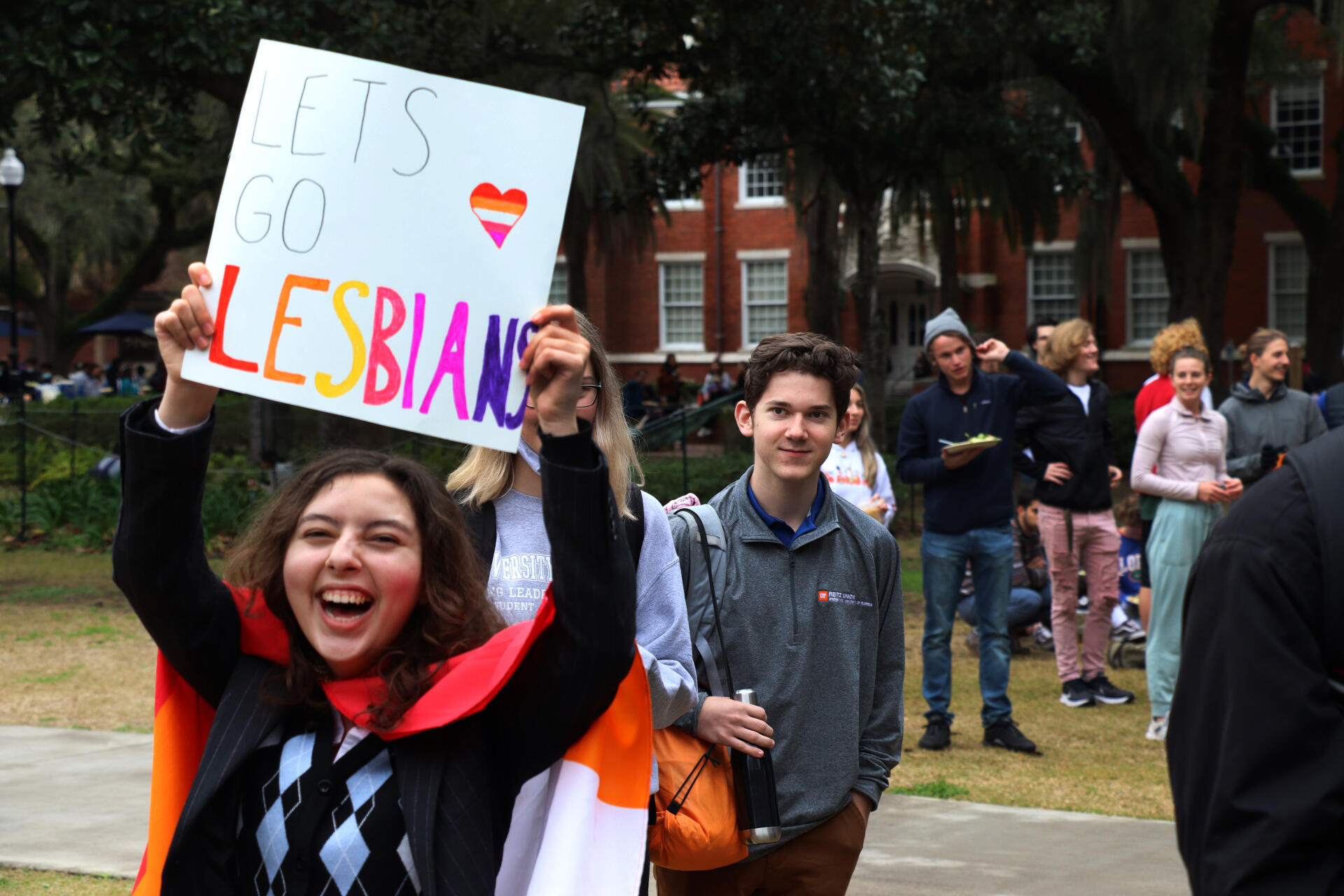
Photo by: Alan Halaly
Harmony Gibaldi, a UF psychology and women's studies sophomore, waving a "Let's Go Lesbians!" sign at the Sister Cindy event in Plaza of the Americas on Monday, Feb. 7.
Alfredo Ortiz, a UF philosophy senior, went up to Brother Jeb before Sister Cindy arrived and kissed his male friend.
Students used Sister Cindy coming to campus as an excuse to make a mockery out of her platform and hateful speech, he said.
“You do have the right to physically remove yourself from the situation,” Ortiz said. “But that doesn't mean that you can leave the situation.”
He said that living in such a digitized age, it's hard to completely ignore something that’s garnering so much attention.
Free speech policies throughout the country are always evolving to reflect changing times. Although UF has changed with regard to its free speech zone policy, some disagree about whether it's for the better.
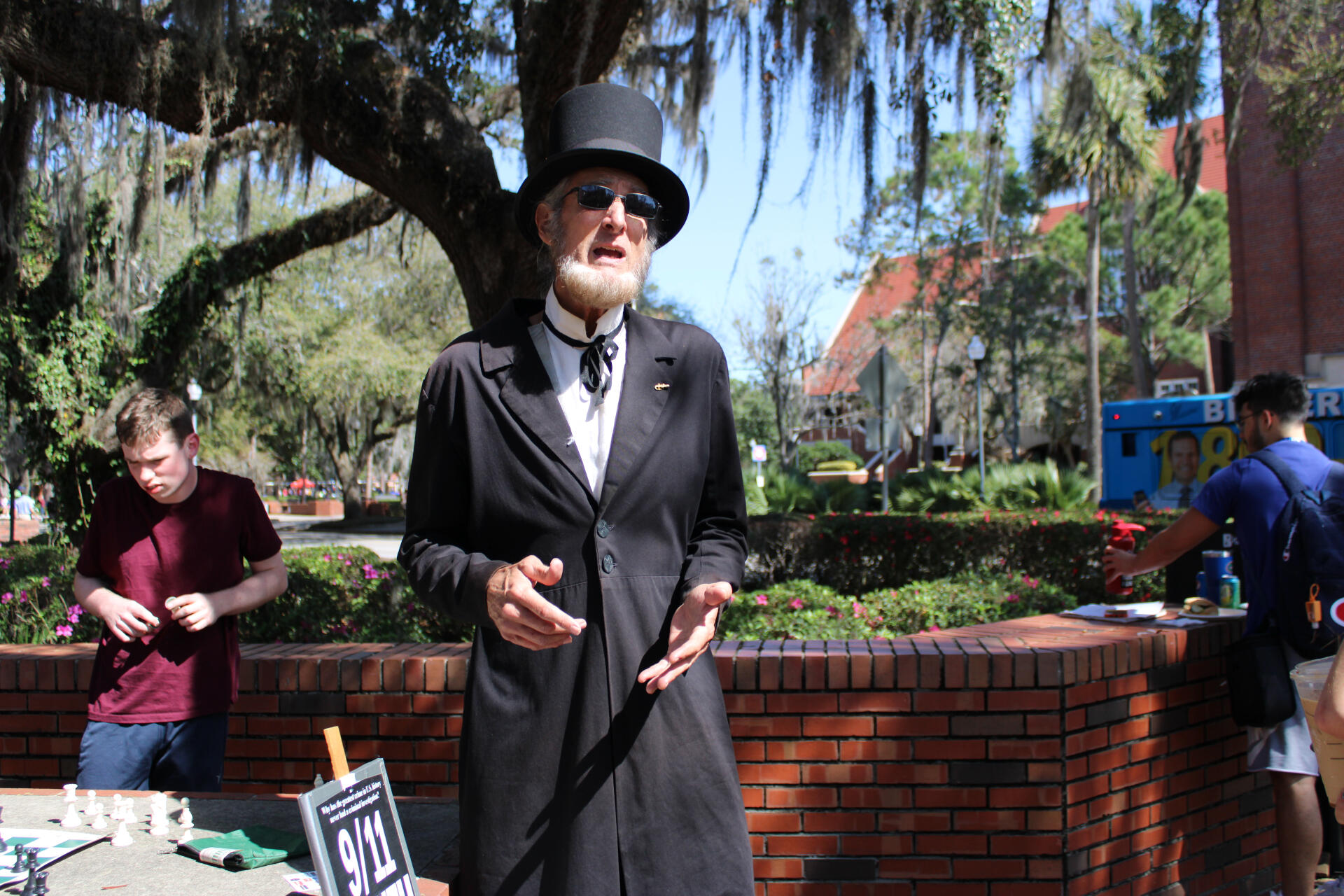
Photo by: Ashleigh Lucas
Abraham Lincoln impersonator Lew Welge in Turlington Plaza arguing with a student on Tuesday, Feb. 22.
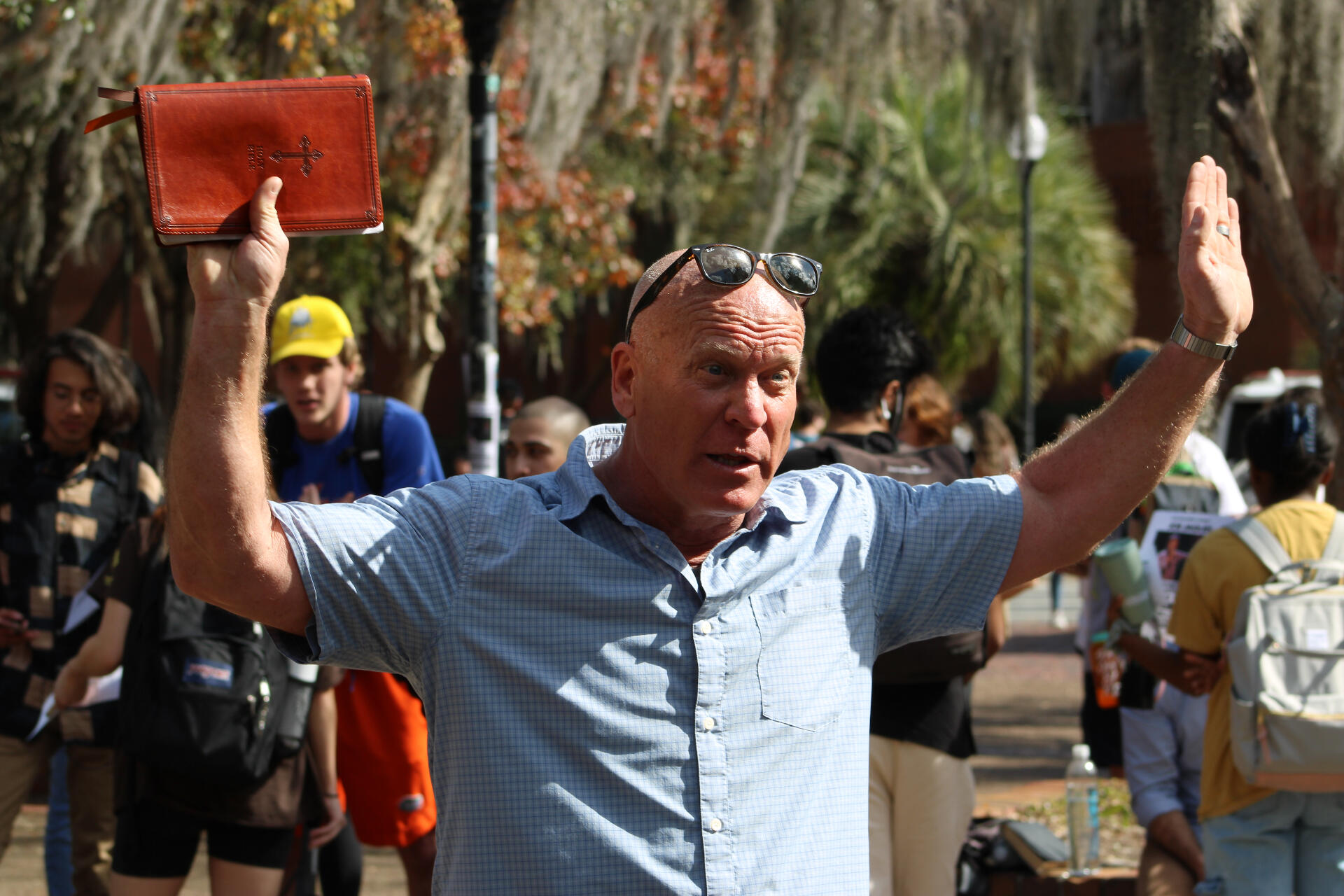
Photo by: Ashleigh Lucas
A preacher at Turlington Plaza arguing with a student about the Bible on Thursday, Feb. 3.
Ringo Mbuya, a UF environmental science junior, said he supports freedom of speech as long as it doesn't harm groups of people who already receive hate and violence like the LGBTQ+ community.
“I don’t have a problem with it as long as they’re not obstructing students on campus,” he said.
However, some students like Ortiz still feel differently about what precedent a Sister Cindy-like visit could set.
“It definitely opens the door to a wider conversation about how we should be opposing these hateful messages on campus,” Ortiz said. “There needs to be something more that we should be doing to prevent those hateful messages from taking hold.”